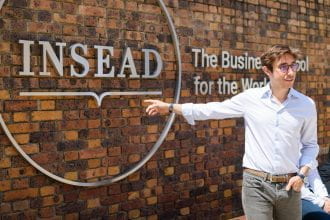In my last editorial for Salamander magazine, I wrote about the urgent need to create a new social contract that aligns the raison d’etre of businesses with the interests of people and the planet. I also encouraged the INSEAD community to contribute to this initiative by modelling new norms and championing business for good.
But how, exactly, do we do this? There is no playbook for creating a new social contract. There is no singular method for advancing business as a force for good. Moreover, the act of modelling new norms is highly individualised; it manifests in different ways for different people.
The best way forward, I believe, begins with taking two steps. First, we need to look inward and question our core purpose as individuals and organisations. We might ask ourselves:
- Have I aligned my organisation’s goals with what society needs?
- What am I doing to protect the health of the planet?
- How am I enabling equal opportunity for everyone?
Second, we need to study and learn from the leaders that are already modelling new norms for business and society and serving as a force for good. INSEAD is fortunate to have many of these exemplary individuals within our own alumni community. Here are four of them.
Hubert Sagnières MBA’86J: Improving lives by improving sight
Poor vision is the world’s leading disability. Currently, more than 2.5 billion people—about one-third of the population—suffer from uncorrected poor vision. At EssilorLuxottica, Executive Vice-Chairman Hubert Sagnières is tackling this problem by leading the development of vision-care solutions that correct, protect and prevent risks to visual health. In addition to designing, manufacturing and distributing quality products and services, EssilorLuxottica is focused on driving philanthropic programmes, deploying inclusive business models and raising awareness on the importance of good vision. The company is the result of a 2017 merger between Essilor, the biggest manufacturer of lenses in the world, and Luxottica, the world’s leading consumer eyewear group.
As CEO of Essilor from 2010-2012, Sagnières emphasised the importance of innovation, partnership and sustainability in the company.

As a result, Essilor currently has 500 researchers and five research centres around the world that are continually improving vision solutions to meet the evolving needs of consumers. It has made more than 120 acquisitions in the last five years and is currently working with partners to launch and scale several inclusive business and non-profit initiatives to help people see and live well. Moreover, it is working continuously to strengthen the company’s environmental-management processes, reduce water usage, improve energy efficiency in manufacturing, reduce its carbon footprint, optimise recycling, limit waste generation and more.

Jacinta Lim MBA’17J and Lina Gedvilaite MBA’17J: Enriching travel experiences while serving local communities
In today’s digital age, it is hard to believe that more than 80% of travel experience bookings are still conducted offline. Not only does this create hassles for tourists looking for trusted travel operators, but it also limits the ability of local guides to reach international customers.
Seek Sophie, a company founded by Jacinta Lim and Lina Gedvilailte, addresses this pain point directly. It brings offline guides online so that travellers can find and book interesting travel experiences directly with local guides—giving tourists access to five times more options at half the price of existing platforms. But this model also has a social benefit: It serves local communities by significantly expanding the businesses of local guides. It also ensures that travel spending and profits stay within the communities themselves, as opposed to going to third parties based outside the country.
Currently, the platform supports local travel guides based in Sri Lanka, Malaysia, Indonesia and Vietnam.
Helen Hai TIEMBA’11Jan: Championing development in Africa
Growing up in China, Helen Hai witnessed first-hand how industrialisation and economic development could transform cities, reduce poverty and create opportunities for people. Today, she is trying to replicate that same transformation in a place further from home: Africa.
Hai is addressing this challenge through several different, but complementary, roles. She is the Founder and CEO of the Made in Africa Initiative, which helps African countries capture industrialisation opportunities by attracting export-oriented, light manufacturing companies. She is the Co-Founder of C&H Garments, a company that makes uniforms and children’s outfits in Rwanda, Senegal and Ethiopia, and employs more than 2,000 people. And she serves as the Goodwill Ambassador for the UN Industrial Development Organization, where she focuses broadly on supporting the industrialisation of Africa. By working on the frontlines and advocating for job creation, Hai has created tens of thousands of jobs in Africa and helped Ethiopia become Africa’s fastest-growing economy.
The takeaway
As these alumni demonstrate, contributing to a new social contract can take many different forms. It is not limited to certain industries or sectors, nor is it isolated to certain types of organisations, such as non-profits or philanthropic foundations. Modelling new social norms is, therefore, a responsibility that all of us needs to embrace, regardless of our professional path. Because if we do not lead this change, then who will? And if we do not start now, then when?
This is our challenge, and our moment, to transform business and society. I know our community can accomplish this—and so much more.
Ilian Mihov
Dean, INSEAD


